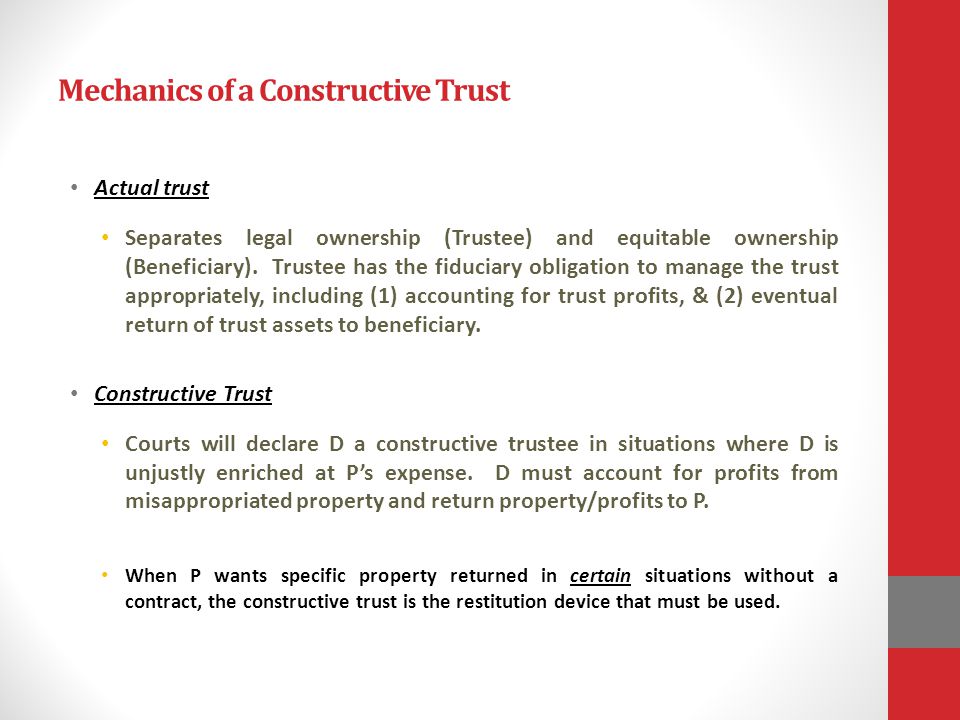Understand the Laws Behind What Is A Constructive Trust and Its Legal Purpose
Wiki Article
Revealing the Benefits of a Positive Rely On Dealing With Recipient Problems
The concept of a constructive trust becomes a critical tool in the intricate realm of beneficiary problems, offering a nuanced solution to disagreements that often arise from wrongful building retention. By cultivating a fiduciary partnership in between events, this fair treatment not only helps with quick resolutions however also serves to deter potential misbehavior. As we check out the diverse advantages of positive trust funds, one might begin to examine just how these systems can improve the landscape of estate disagreements and add to a much more equitable circulation of properties among beneficiaries.Interpretation of Constructive Trust Fund
A useful depend on is regularly established by courts to address scenarios where one celebration has wrongfully acquired or kept home that rightfully comes from one more (What Is A Constructive Trust). This legal principle is not a standard count on, as it does not call for the rules generally linked with count on creation, such as a created agreement or the purpose of the parties entailed. Instead, a positive count on emerges by procedure of legislation, working as an equitable treatment to avoid unjustified enrichmentThe courts impose a useful trust when it is figured out that celebration holds residential or commercial property under conditions that, in equity and good principles, should not permit them to preserve it. Common situations involve illegal actions, breaches of fiduciary task, or circumstances where a celebration has actually gotten residential or commercial property with inappropriate methods. The positive depend on hence operates to secure the civil liberties of the rightful owner by making certain that the residential property is held for their advantage.
Once established, the positive depend on needs the event in possession of the residential or commercial property to share it to the rightful proprietor, hence fixing the wrongful situation. This device highlights the legal system's dedication to justness and justice in building conflicts, emphasizing the importance of ethical conduct in possession and transfer of properties.
Benefits of Positive Depends On
Constructive trusts use numerous significant advantages in lawful conflicts involving property civil liberties. Mostly, they work as an equitable solution, allowing courts to address circumstances where a party has actually wrongfully acquired or maintained property that rightfully comes from an additional. This develops a framework for fairness, ensuring that the rightful proprietor is compensated and the unjust enrichment of the criminal is curtailed.Furthermore, positive trusts can quicken resolution in disputes over estate assets, thereby lowering the prolonged and frequently contentious lawsuits processes connected with standard residential property conflicts. Their adaptability enables courts to customize treatments to fit the specific scenarios of each case, which can bring about more satisfactory end results for all parties included.
In addition, useful trust funds advertise openness and responsibility amongst fiduciaries and recipients, as they require the latter to act in the ideal passions of the former. This enhances the integrity of fiduciary connections, cultivating count on and cooperation. Finally, by inhibiting misconduct pertaining to residential property possession, constructive depends on add to the overall stability of monetary and lawful systems, making certain that home civil liberties are valued and upheld within society.
Just How Positive Trust Funds Job

In technique, when a positive trust fund is enforced, the court recognizes the property concerned and establishes a fiduciary relationship in between the events involved. The party who holds the residential or commercial property ends up being a trustee, obligated to manage it for the benefit of the rightful owner, called the recipient. This partnership is not based upon an official arrangement yet instead on the principle of equity, aiming to rectify situations where one event's gain straight correlates with one more's loss.

Situation Studies and Examples
When analyzing the functional application of positive trust funds, various instance researches show just how courts browse complicated situations entailing unfair enrichment. One noteworthy case is * Pettkus v. the original source Becker *, where the High Court of copyright established a positive depend on to correct the unjustified enrichment of one event over an additional in a lasting relationship. The court see here determined that the payments of one partner to the procurement of property validated the imposition of a useful trust, guaranteeing equitable distribution.One more significant example is * Gisborne v. Gisborne *, where the court enforced a constructive trust fund to deal with the cases of siblings over their dead bro's estate. The court acknowledged the payments made by the siblings in preserving the family residential property, resulting in a choice that called for the estate to account for those payments, therefore avoiding unjust enrichment.
These situations exhibit how constructive depends on can effectively fix disagreements by focusing on fairness and the prevention of unfair enrichment. By checking out the certain payments and circumstances of the parties included, courts can use positive trusts to accomplish just results, inevitably enhancing the fair concepts underpinning these lawful devices.

Actions to Establish a Useful Trust Fund
To establish a useful trust fund, several essential actions must be followed to make sure that the case is validated and lawfully identified. First, the plaintiff needs to show the presence of a fiduciary connection or a scenario that warrants the imposition of a useful depend on, such as fraudulence, unjust enrichment, or a breach of responsibility.Second, it is important to gather and present compelling evidence that sustains the claim. This includes documentation and testimonies that illustrate the circumstances leading to the alleged wrongful retention of residential property or advantages by the trustee.
Third, the plaintiff must file an application in the appropriate court, articulating the premises for asking for the charge of a useful count on. This petition should outline the specifics of the relationship and the unjustified enrichment that demands the depend on.
Final Thought
In final thought, Find Out More positive counts on stand for an essential fair solution in the realm of beneficiary disputes, properly dealing with wrongful building retention and preventing unfair enrichment. Inevitably, positive counts on promote justness amongst recipients, ensuring that rightful ownership is preserved and protected.
A useful depend on is regularly developed by courts to address circumstances where one celebration has actually wrongfully gotten or preserved property that rightfully belongs to one more.The courts impose a useful trust fund when it is determined that one party holds home under scenarios that, in equity and great principles, must not allow them to maintain it. By preventing misbehavior associated to residential property possession, useful counts on contribute to the overall security of monetary and legal systems, guaranteeing that home legal rights are respected and upheld within culture.
In technique, when a positive depend on is imposed, the court determines the home in question and develops a fiduciary partnership between the parties involved. What Is A Constructive Trust. The court established that the payments of one partner to the acquisition of property warranted the imposition of a positive trust, guaranteeing fair circulation
Report this wiki page